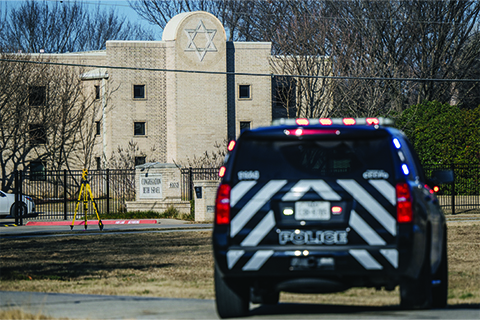The Dark Side of Social Media: How it Fuels Antisemitism

A rally to combat antisemitism in Miami Beach, Florida, in November 2015. (Photo by Joe Raedle/Getty Images)
May 13, 2022
According to the Anti-Defamation League, 2021 was a low point in the history of American antisemitism.
The organization tallied 2,717 antisemitic incidents for that year, the most since it began collecting data in 1979.
In the newly published book "Antisemitism on Social Media," a group of scholars examines how Twitter, Facebook, TikTok and other platforms may be fueling this rise in the United States and globally.
Co-edited by Sabine von Mering, professor of German and women's, gender and sexuality studies, and Monika Hübscher, a PhD candidate at the University of Haifa, Israel, it is the first comprehensive academic study of the subject.
Here are some of the book's major findings and conclusions:
Social media is helping extremist groups spread their message and recruit new members.
In her chapter, the Southern Poverty Law Center's Cassie Miller writes that today's right-wing movement is a loose, messy and decentralized conglomeration of groups, ideal for exploiting the loose, messy and decentralized nature of social media.
When a group is banned on one platform, it can pop up on another platform or have another group carry the ball forward. Miller says that when the extremist U.S.-based groups the Base and Atomwaffen Division collapsed in 2020, their absence "was hardly noticeable" on social media because other groups immediately filled in.
Miller traces how beginning in the early 2010s, members of antisemitic groups began a campaign on social media using the message, "read siege," a reference to a violently antisemitic text written by neo-Nazi James Mason in the 1980s.
Because the meme was coded, it wasn't flagged as hate speech by the social media platforms, and it spread widely. Eventually, a Twitter user who went by the handle @ReidSeej fooled the celebrity gossip columnist Perez Hilton into saying "read siege" in a Christmas video.
"Social media platforms, unwittingly or not, have facilitated" antisemitism, Miller writes, "and are, therefore, implicated in the violence that emanates from it."
However, it's important to point out that antisemitic content represents a tiny fraction of the traffic on social media. In his chapter in the book, Michael Bossetta, a researcher at Sweden's Lund University, says most studies find that antisemitic content makes up well under 1% of the total number of posts worldwide. In one major survey, it was as little as 0.00015%.
"The bulk of evidence points to antisemitic content being much less visible on social media than commonly perceived," Bossetta concludes.
QAnon traffics in antisemitic tropes.
The QAnon movement, which has used social media to move from the fringes to the political mainstream, would seem mostly focused on spreading conspiracy theories about Donald Trump and the Democratic Party.
But Armin Langer, a Phd student at Germany's Humboldt University, argues in the book that even if the movement doesn't truck explicitly in antisemitism, its conspiracy theories still draw on historically antisemitic lore and themes.
Take the idea of the deep state. Langer traces its origins back to the late 18th century when the Prussian Lutheran pastor Johann Heinrich Schulz accused Jews of walling themselves off from the larger societies in which they lived to form a "state within a state" ("Staat im Staate"), governed by its own religious laws.
In the infamous antisemitic tract, "The Protocols of the Elders of Zion," the idea of a Jewish "state within a state" goes hand-in-hand with the concept of a Jewish world conspiracy. "Both these theories promote the idea of the existence of a secretive group that works according to their own rules, separately from the majority," Langer writes.
Langer sees a parallel between QAnon's obsession with the Jewish financier and philanthropist George Soros and past antisemitic conspiracy theories about the power of the Jewish banking family, the Rothschilds.
He also says that QAnon's focus on pedophilia and sex abuse has roots in the blood libel, the long-held belief that Jews ritually sacrifice Christian children at Passover to obtain their blood for matzah.
Langer says QAnon's adherents use"antisemitic dog-whistle politics," referencing "people, terms and narratives that may appear vague and harmless without context, but which signal a form of antisemitic hate speech."
TikTok exposes children to antisemitism.
"TikTok has become a magnet and a hotbed for violent and extremist content," the Israeli researchers Gabriel Weimann and Natalie Masri write in their chapter. This is particularly alarming, they point out, because of the platform's huge popularity with tweens and teenagers.
Weimann and Masri analyzed TikTok's content between February and May of 2020 and 2021. They found a 41% increase in antisemitic posts, a 912% increase in antisemitic comments and a 1,375% increase in antisemitic usernames.
Though the increases are large, the actual amount of content remains minuscule when compared to the total amount of material on the platform.
But TikTok's huge user base — over one billion — means that even one post can reach a huge audience. An antisemitic song about Jewish people being killed in Auschwitz, for example, was accessed more than six million times worldwide.
Weimann and Masri are especially troubled that TikTok had announced a crackdown on hate speech in October 2020, yet their findings showed that antisemitic material was still being posted.
Jews in their 20s and 30s struggle with antisemitic attacks on social media.
For young Jewish adults, the fear of being the target of an antisemitic attack on social media is omnipresent.
In his chapter, German social scientist Quint Czymmek cites a 2019 study that found that young European Jews (ages 16-34) were more likely to have experienced antisemitic harassment or violence than older Jews and that these younger Jews said the internet and social media was where antisemitism is most problematic today.
In-depth interviews Czymmek conducted with three young German Jewish adults revealed that being on the receiving end of an antisemitic social media post produced a sense of "loss of control," "unawareness of what would happen next," and despair over "the silence of other users."
The interviewees all said they had witnessed a substantial amount of antisemitism on social media, and it typically took the form of anti-Israel invective.
One of the study's participants decided to keep his Jewish identity on social media hidden. "This anonymity protects me very much," he said. It "keeps the hate at bay."
But another participant said she found the connections she forged with other Jews on social media supportive and vital in facing the threat of antisemitism. "I have all this solidarity and this love, and this is so wonderful," she told Czymmek.
All the participants felt they could not turn to outsiders for help with antisemitism. "There is a strong feeling that real support would only come from the Jewish community," Czymmek wrote.
Don't engage with antisemites on social media.
According to Brandeis University's Sabine von Mering, you shouldn't respond, share, repost or engage with the material in any way.
Social media's algorithms reward content that elicits user responses, even if those responses are negative. Even if you denounce an antisemitic post or call out the person who published it, you increase the likelihood that the content will be promoted on the platform.
Most platforms now have methods for reporting hate speech. Use those, von Mering said in an interview.
She also suggests finding ways to show empathy and solidarity with those who are being attacked, for example, by declaring your solidarity with them on your own page. Solidarity with victims of hate speech is very important, she said.
If you are a victim of antisemitism, it's perfectly fine to seek support and comfort from your network on social media. Just don't share the post in which you were attacked, von Mering said. Instead, create a new post, alerting your friends and family.




